Unit1 SectionA GrammarFocus~3c(课件+嵌入视频)【2023秋人教八上英语高效实用备课】
文档属性
| 名称 | Unit1 SectionA GrammarFocus~3c(课件+嵌入视频)【2023秋人教八上英语高效实用备课】 | 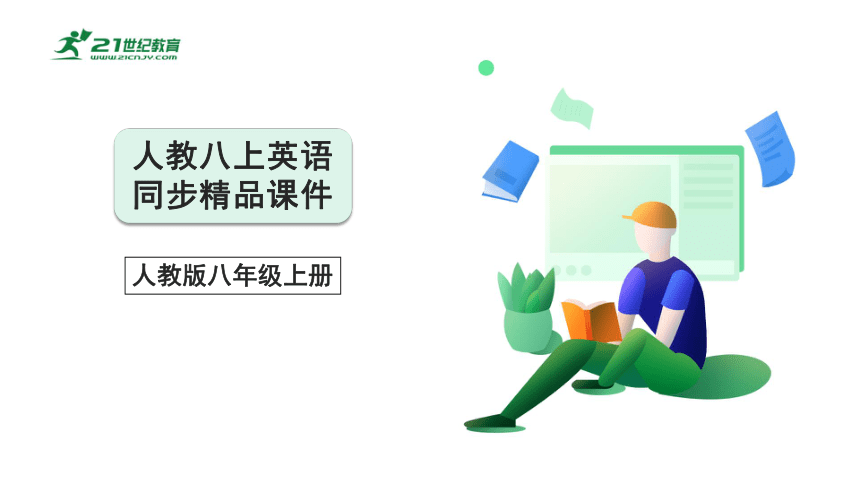 | |
| 格式 | pptx | ||
| 文件大小 | 53.5MB | ||
| 资源类型 | 试卷 | ||
| 版本资源 | 人教新目标(Go for it)版 | ||
| 科目 | 英语 | ||
| 更新时间 | 2023-08-31 19:20:31 | ||
图片预览

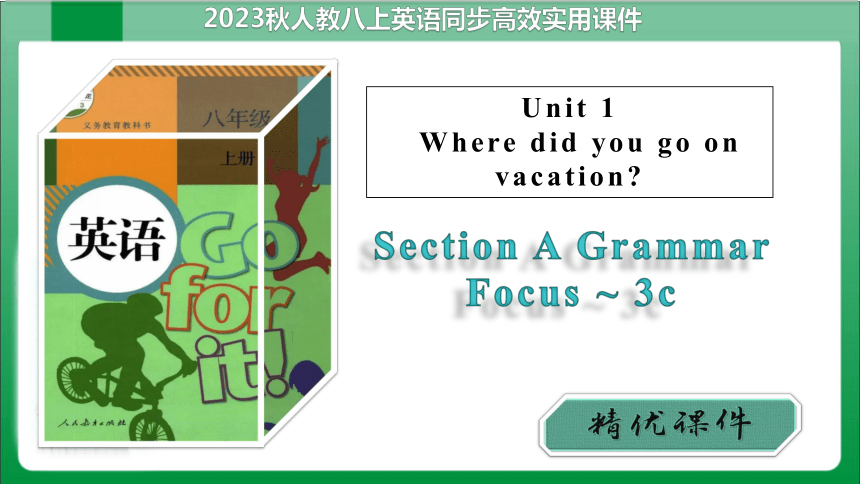
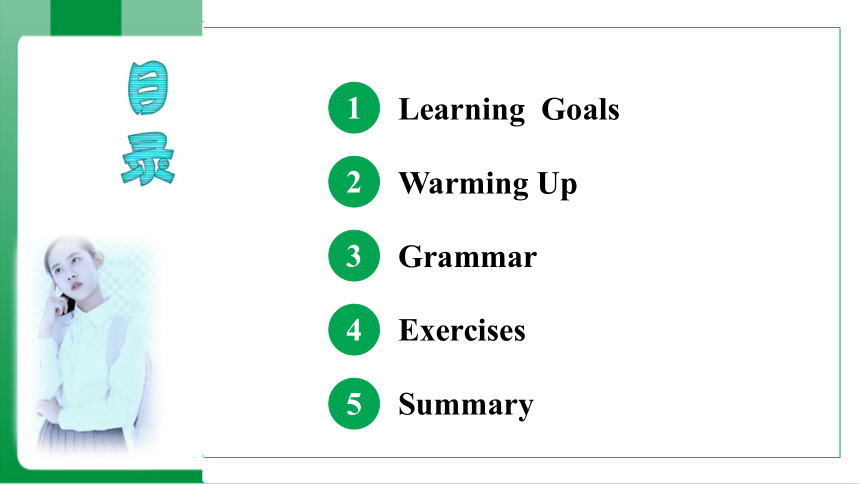
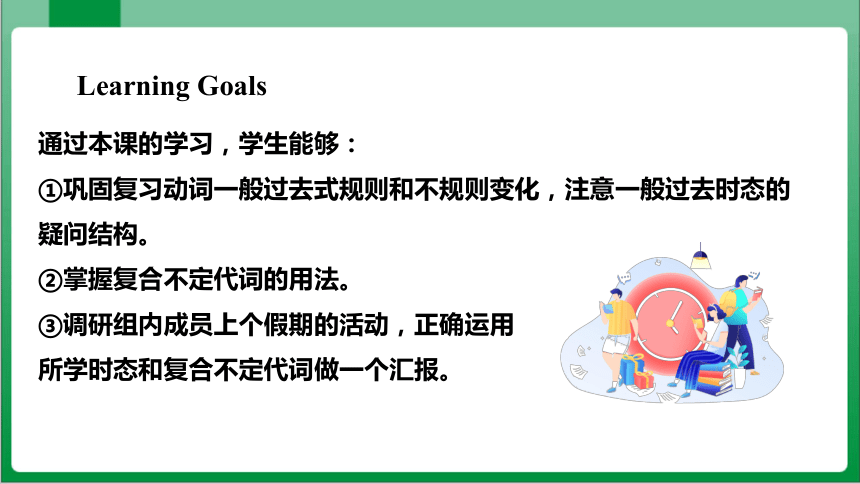
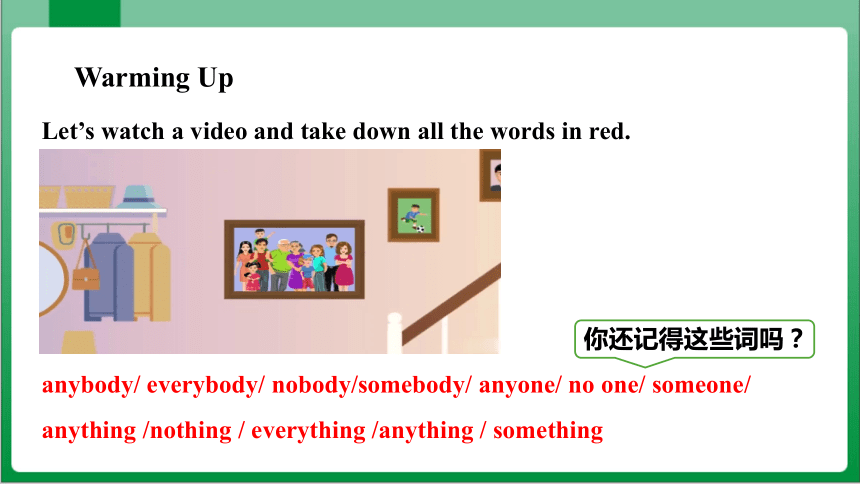
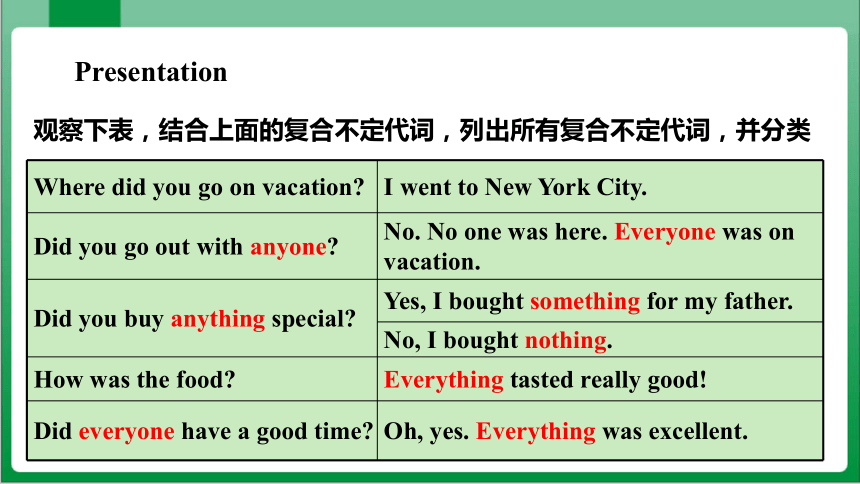
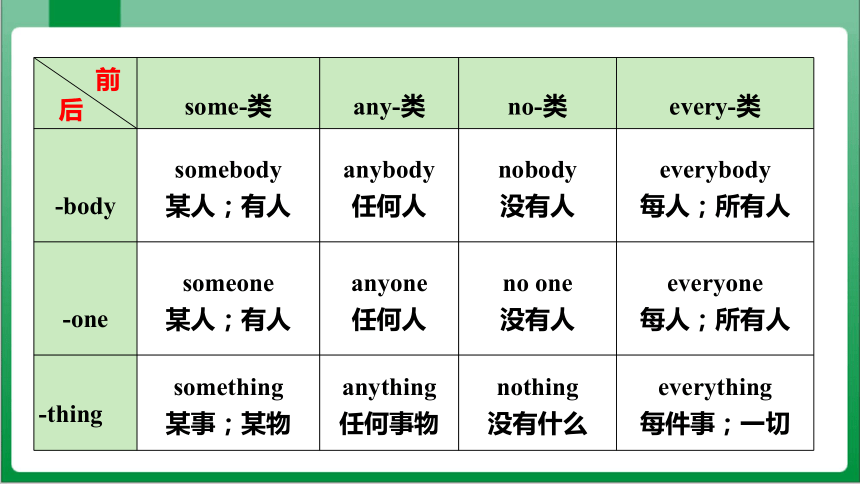
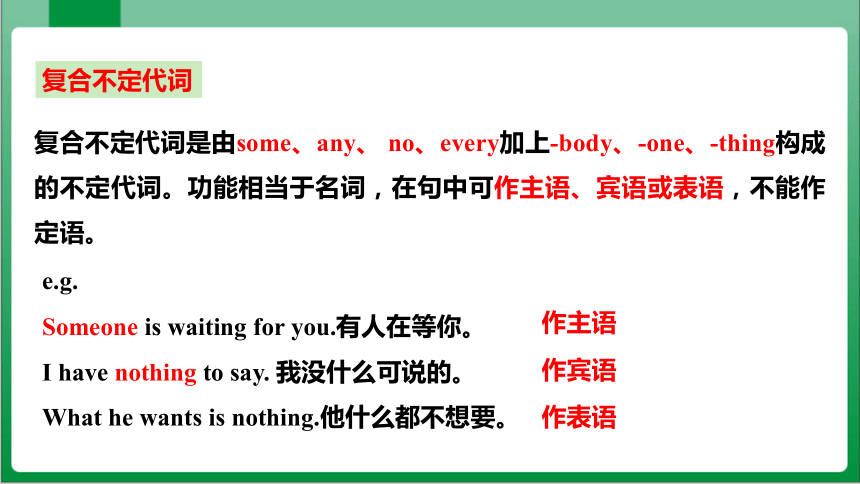
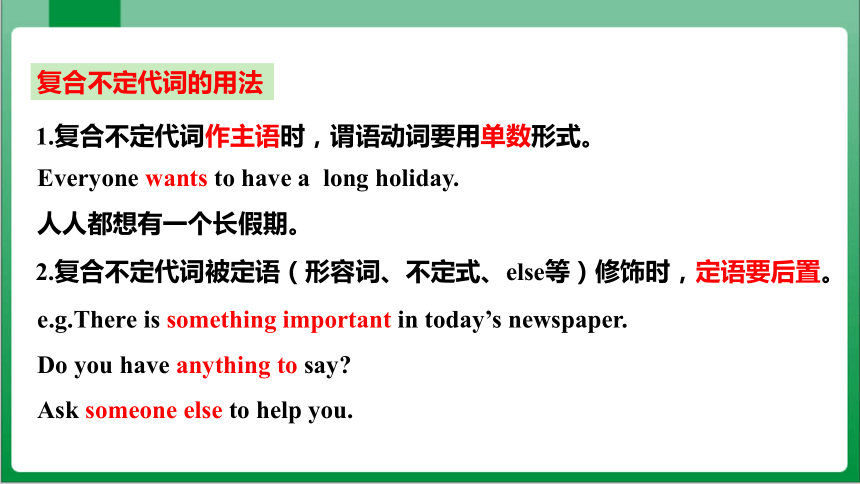
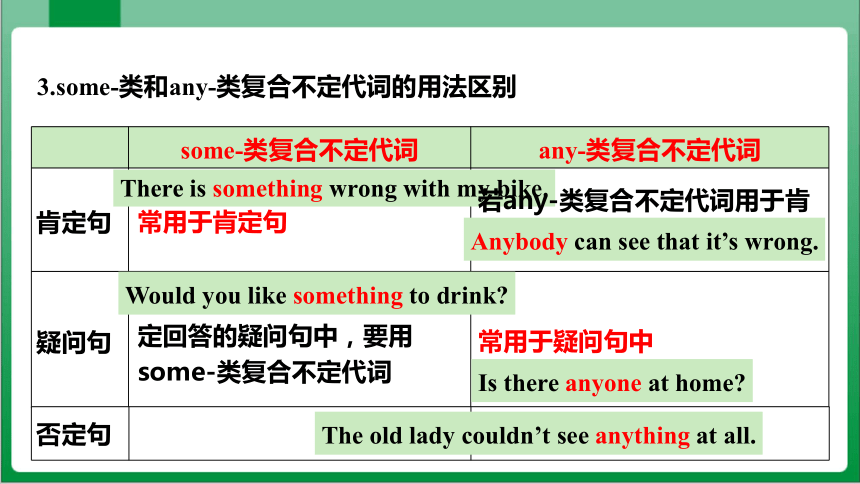
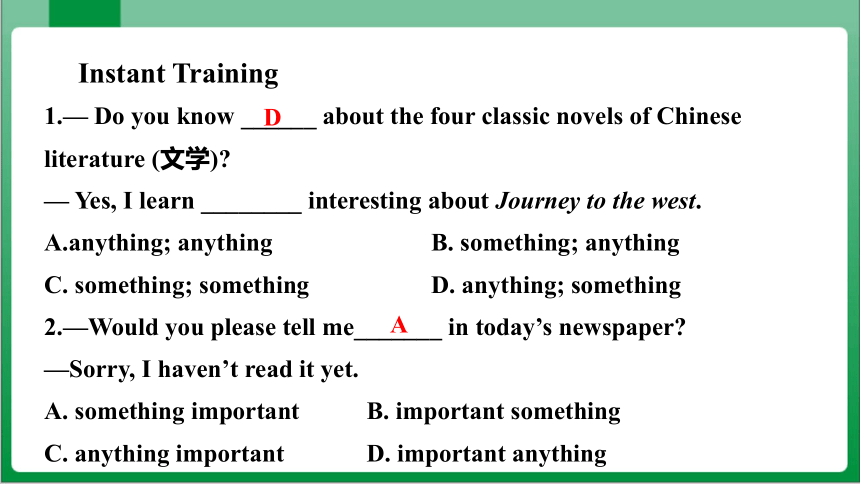
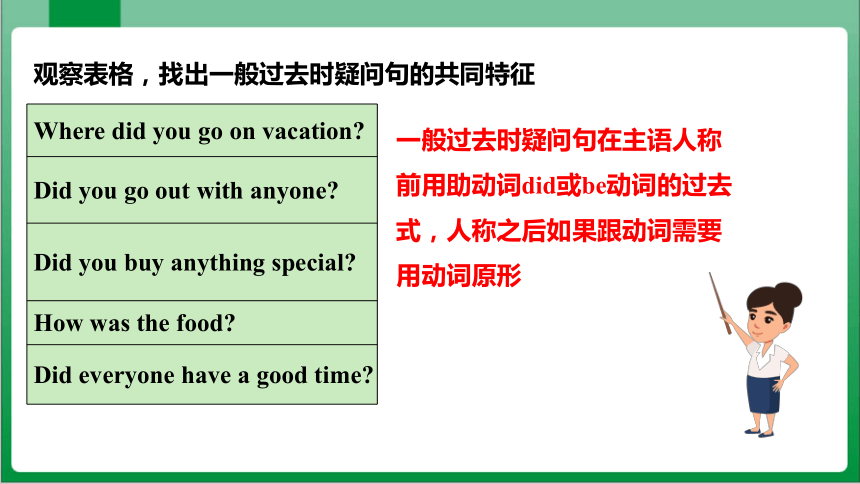
文档简介
(共38张PPT)
人教八上英语同步精品课件
人教版八年级上册
Unit 1
Where did you go on vacation
Section A Grammar Focus ~ 3c
Learning Goals
Warming Up
Grammar
Summary
Exercises
1
1
2
3
4
5
通过本课的学习,学生能够:
①巩固复习动词一般过去式规则和不规则变化,注意一般过去时态的疑问结构。
②掌握复合不定代词的用法。
③调研组内成员上个假期的活动,正确运用
所学时态和复合不定代词做一个汇报。
Learning Goals
Let’s watch a video and take down all the words in red.
Warming Up
anybody/ everybody/ nobody/somebody/ anyone/ no one/ someone/ anything /nothing / everything /anything / something
你还记得这些词吗?
Where did you go on vacation I went to New York City.
Did you go out with anyone No. No one was here. Everyone was on vacation.
Did you buy anything special Yes, I bought something for my father.
No, I bought nothing.
How was the food Everything tasted really good!
Did everyone have a good time Oh, yes. Everything was excellent.
Presentation
观察下表,结合上面的复合不定代词,列出所有复合不定代词,并分类
some-类 any-类 no-类 every-类
-body somebody 某人;有人 anybody 任何人 nobody 没有人 everybody
每人;所有人
-one someone 某人;有人 anyone 任何人 no one 没有人 everyone
每人;所有人
-thing something 某事;某物 anything 任何事物 nothing 没有什么 everything
每件事;一切
前
后
e.g.
Someone is waiting for you.有人在等你。
I have nothing to say. 我没什么可说的。
What he wants is nothing.他什么都不想要。
复合不定代词是由some、any、 no、every加上-body、-one、-thing构成的不定代词。功能相当于名词,在句中可作主语、宾语或表语,不能作定语。
作主语
作宾语
复合不定代词
作表语
1.复合不定代词作主语时,谓语动词要用单数形式。
2.复合不定代词被定语(形容词、不定式、else等)修饰时,定语要后置。
复合不定代词的用法
Everyone wants to have a long holiday.
人人都想有一个长假期。
e.g.There is something important in today’s newspaper.
Do you have anything to say
Ask someone else to help you.
3.some-类和any-类复合不定代词的用法区别
some-类复合不定代词 any-类复合不定代词
肯定句
疑问句
常用于肯定句
There is something wrong with my bike.
在表示请求并希望得到对方肯定回答的疑问句中,要用some-类复合不定代词
Would you like something to drink
若any-类复合不定代词用于肯定句时,表示“随便哪个”
Anybody can see that it’s wrong.
常用于疑问句中
Is there anyone at home
否定句
常用于否定句中
The old lady couldn’t see anything at all.
Instant Training
1.— Do you know ______ about the four classic novels of Chinese literature (文学)
— Yes, I learn ________ interesting about Journey to the west.
A.anything; anything B. something; anything
C. something; something D. anything; something
2.—Would you please tell me_______ in today’s newspaper
—Sorry, I haven’t read it yet.
A. something important B. important something
C. anything important D. important anything
D
A
Where did you go on vacation
Did you go out with anyone
Did you buy anything special
How was the food
Did everyone have a good time
观察表格,找出一般过去时疑问句的共同特征
一般过去时疑问句在主语人称前用助动词did或be动词的过去式,人称之后如果跟动词需要用动词原形
句式结构
表示含义
时间状语
主系表:主语+was/were+其他.
主谓宾:主语+动词过去式+其他.
过去某个时间发生的动作或存在的状态;也表示过去经常或反复发生的动作。
yesterday
last month
last year
just now
…ago
in 2020
一般过去时
句子类型 含be动词 含行为动词
肯定句 主语 + was/were + 其他. 主语 + 动词过去式 + 其他.
否定句 主语 + was/were + not + 其他. 主语 + didn’t + 动词原形 + 其他.
一般疑问句 Was/Were + 主语+其他 Did + 主语 + 动词原形 + 其他
一般过去时的句式结构
句子类型 含be动词 含行为动词
一般疑问句的肯定回答 Yes, 主语 + was/were. Yes, 主语 + did.
一般疑问句的否定回答 No, 主语 +wasn’t/weren’t. No, 主语 + didn’t.
I was in Beijing last month.
I went to Shanghai last Friday.
I wasn’t in Beijing last month.
I didn’t go to Shanghai last Friday.
—Were you in Beijing last month
—Yes, I was. /No, I wasn’t.
—Did you go to Shanghai last Friday
—Yes, I did. /No, I didn’t.
肯定句
否定句
一般疑问句
be动词
行为动词
规则变化
类别 构成方法 例词与发音 读音规则
play-played/ple d/ offer-offered/ f (r)d/ 清辅音后读/t/,浊辅音和元音后读/d/,t和d后面
读/ d/、/id/
动词变过去式的规则
加-ed
一般情况
类别 构成方法 例词与发音 读音规则
like-liked/la kt/ hate-hated/ he t d/ 清辅音后读/t/,浊辅音和元音后读/d/,t和d后面
读/ d/、/id/
以e结尾的动词
加-d
类别 构成方法 例词与发音 读音规则
cry-cried/kra d/ study-studied/ st did/ 清辅音后读/t/,浊辅音和元音后读/d/,t和d后面
读/ d/、/id/
以“辅音字母+ y”结尾的动词
变y为i,再加-ed
类别 构成方法 例词与发音 读音规则
plan-planned/pl nd/ stop-stopped/st pt/ 清辅音后读/t/,浊辅音和元音后读/d/,t和d后面读/ d/、
/id/
闭即关,闭音节就是辅音字母把元音字母关里面了。
以重读闭音节结尾,且末尾只有一个辅音字母的动词
双写最后一个辅音字母,再加-ed
类别 例词
过去式和原形一样
中间元音字母变化 i-a
i-o
以ow/aw结尾的词,把ow/aw变成ew
结尾的d变为t
不规则变化
cut-cut read-read put-put
swim-swam begin-began sit-sat
ride-rode drive-drove write-wrote
draw-drew throw-threw blow-blew
build-built spend-spent lend-lent
类别 例词
过去式以o(a)ught结尾
以n结尾的词,在词尾加t
含有双写字母的词,将双写改为单写,在词尾加t
bring-brought teach-taught catch-caught
mean-meant burn-burnt learn-learnt
feel-felt smell-smelt keep-kept
Instant Training
1.Did she go to the movies with her parents last night (补全否定答语)
No,_____________.
2.Eric wanted to buy something cheap.(改为一般疑问句)
_______Eric__________to buy______________cheap
she didn’t
Did want anything
3a.Fill in the blanks with the words in the box and practice the conversation.
anyone something anything everything nothing
Linda: Did you do _________ fun on your vacation, Alice
Alice: Yes, I did. I went to Sanya.
Linda: How did you like it
Alice: Well, it was my first time there, so __________ was really interesting.
Linda: Did you go with ________
anything
everything
anyone
Practice
Alice: Yes, I did. I went with my sister.
Linda: Did you go shopping
Alice: Of course! I bought __________ for my parents, but_________
for myself.
Linda: Why didn’t you buy _________ for yourself
Alice: I didn’t really see__________ I liked.
something
nothing
anything
anything
去购物
buy sth. for sb.为某人买某物
为了我自己
为了你自己
3b.Fill in the blanks in the e-mail message with the words in the box.
anything everything nothing everyone no one
Dear Bill,
How was your vacation Did you do _________ interesting Did _________________ in the family go with you I went to a friend’s farm in the countryside with my family. ___________was great.
anything
everyone/anyone
Everything
在乡下
anything everything nothing everyone no one
We fed some hens and saw some baby pigs. They were so cute! The only problem was that there was _________ much to do in the evening but
read. Still ___________seemed to be bored.① Bye for now!
Mark
nothing
no one
喂了一些母鸡
there is nothing to do but do 除了做某事没什么事可以做
Read the e-mail in 3b again and answer the questions:
1.Where did Mark go on his vacation
He went to a friend’s farm in the countryside with his family.
2.How was his vacation
It was great.
3.What was the problem
There was nothing much to do in the evening but read.
4.Did anyone seem bored
No one seemed to be bored.
3c. Ask your group questions about their last vacation. Then tell the class your results.
Did you... Everyone Someone (write the classmate's name) No one
eat anything at a restaurant
In our group, everyone ate something at a restaurant...
Production
read anything interesting
visit anyone in your family
buy anything
keep a diary
去购物 ______________________
给某人买某物 ______________________
为了我/你自己 ______________________
在乡下 ______________________
喂了一些母鸡 ______________________
除了做某事没什么事可以做
______________________
似乎要做某事 ______________________
go shopping
buy sth. for sb.
for myself/ yourself
in the countryside
feed some hens
there is nothing to do but do
Key Phrases
seem to do
1. Still no one seemed to be bored.
Language Point
seem v. 好像,似乎,看来
seem to do 似乎要做某事
seem (to be) + adj./n. 似乎/好像……
seem like a good idea 好像是个好主意
It seems (to sb.) that +句子 (对某人来说)似乎/好像……
It seems that no one knows what has happened in the park.
似乎没有人知道,在公园里发生了什么事。
返回
Instant Training
1.She seems ____________(enjoy) listening to the radio.
2.我好像把我的汽车钥匙给丢了。
_____________ I have lost my car keys.
to enjoy
It seems that
一、完成句子。
1.昨天我和妈妈一起去买东西了。
I _______________ with my mother yesterday.
2.上周末汤姆看望了在乡下的爷爷和奶奶。
Last weekend Tom visited his grandpa and grandma
_____________________.
3.昨晚除了看报纸我无事可做。
I had _______________ but to read the newspaper last night.
went shopping
in the countryside
Exercises
nothing to do
二、将下列句子翻译成英语
1. 刚才有人把我的英语书拿走了。 (someone)
_________________________________________________
2. 你昨天给自己买东西了吗? (buy ... for ...)
_________________________________________________
3. 去年我为自己写了一本书。 (myself)
__________________________________________________
4. Maria今天早上起晚了,所以她什么也没吃。 (nothing)
___________________________________________________
Did you buy anything for yourself yesterday
Someone took away my English book just now.
I wrote a book for myself last year.
Maria got up late this morning, so she ate / had nothing.
Summary
1. Grammar:复习不定代词的用法&一般过去时的句式结构
2. Key words and expressions: buy...for, go shopping, in the countryside, feed hens, have nothing to do but do sth., seem
谢谢
21世纪教育网(www.21cnjy.com)
中小学教育资源网站
兼职招聘:
https://www.21cnjy.com/recruitment/home/admin
人教八上英语同步精品课件
人教版八年级上册
Unit 1
Where did you go on vacation
Section A Grammar Focus ~ 3c
Learning Goals
Warming Up
Grammar
Summary
Exercises
1
1
2
3
4
5
通过本课的学习,学生能够:
①巩固复习动词一般过去式规则和不规则变化,注意一般过去时态的疑问结构。
②掌握复合不定代词的用法。
③调研组内成员上个假期的活动,正确运用
所学时态和复合不定代词做一个汇报。
Learning Goals
Let’s watch a video and take down all the words in red.
Warming Up
anybody/ everybody/ nobody/somebody/ anyone/ no one/ someone/ anything /nothing / everything /anything / something
你还记得这些词吗?
Where did you go on vacation I went to New York City.
Did you go out with anyone No. No one was here. Everyone was on vacation.
Did you buy anything special Yes, I bought something for my father.
No, I bought nothing.
How was the food Everything tasted really good!
Did everyone have a good time Oh, yes. Everything was excellent.
Presentation
观察下表,结合上面的复合不定代词,列出所有复合不定代词,并分类
some-类 any-类 no-类 every-类
-body somebody 某人;有人 anybody 任何人 nobody 没有人 everybody
每人;所有人
-one someone 某人;有人 anyone 任何人 no one 没有人 everyone
每人;所有人
-thing something 某事;某物 anything 任何事物 nothing 没有什么 everything
每件事;一切
前
后
e.g.
Someone is waiting for you.有人在等你。
I have nothing to say. 我没什么可说的。
What he wants is nothing.他什么都不想要。
复合不定代词是由some、any、 no、every加上-body、-one、-thing构成的不定代词。功能相当于名词,在句中可作主语、宾语或表语,不能作定语。
作主语
作宾语
复合不定代词
作表语
1.复合不定代词作主语时,谓语动词要用单数形式。
2.复合不定代词被定语(形容词、不定式、else等)修饰时,定语要后置。
复合不定代词的用法
Everyone wants to have a long holiday.
人人都想有一个长假期。
e.g.There is something important in today’s newspaper.
Do you have anything to say
Ask someone else to help you.
3.some-类和any-类复合不定代词的用法区别
some-类复合不定代词 any-类复合不定代词
肯定句
疑问句
常用于肯定句
There is something wrong with my bike.
在表示请求并希望得到对方肯定回答的疑问句中,要用some-类复合不定代词
Would you like something to drink
若any-类复合不定代词用于肯定句时,表示“随便哪个”
Anybody can see that it’s wrong.
常用于疑问句中
Is there anyone at home
否定句
常用于否定句中
The old lady couldn’t see anything at all.
Instant Training
1.— Do you know ______ about the four classic novels of Chinese literature (文学)
— Yes, I learn ________ interesting about Journey to the west.
A.anything; anything B. something; anything
C. something; something D. anything; something
2.—Would you please tell me_______ in today’s newspaper
—Sorry, I haven’t read it yet.
A. something important B. important something
C. anything important D. important anything
D
A
Where did you go on vacation
Did you go out with anyone
Did you buy anything special
How was the food
Did everyone have a good time
观察表格,找出一般过去时疑问句的共同特征
一般过去时疑问句在主语人称前用助动词did或be动词的过去式,人称之后如果跟动词需要用动词原形
句式结构
表示含义
时间状语
主系表:主语+was/were+其他.
主谓宾:主语+动词过去式+其他.
过去某个时间发生的动作或存在的状态;也表示过去经常或反复发生的动作。
yesterday
last month
last year
just now
…ago
in 2020
一般过去时
句子类型 含be动词 含行为动词
肯定句 主语 + was/were + 其他. 主语 + 动词过去式 + 其他.
否定句 主语 + was/were + not + 其他. 主语 + didn’t + 动词原形 + 其他.
一般疑问句 Was/Were + 主语+其他 Did + 主语 + 动词原形 + 其他
一般过去时的句式结构
句子类型 含be动词 含行为动词
一般疑问句的肯定回答 Yes, 主语 + was/were. Yes, 主语 + did.
一般疑问句的否定回答 No, 主语 +wasn’t/weren’t. No, 主语 + didn’t.
I was in Beijing last month.
I went to Shanghai last Friday.
I wasn’t in Beijing last month.
I didn’t go to Shanghai last Friday.
—Were you in Beijing last month
—Yes, I was. /No, I wasn’t.
—Did you go to Shanghai last Friday
—Yes, I did. /No, I didn’t.
肯定句
否定句
一般疑问句
be动词
行为动词
规则变化
类别 构成方法 例词与发音 读音规则
play-played/ple d/ offer-offered/ f (r)d/ 清辅音后读/t/,浊辅音和元音后读/d/,t和d后面
读/ d/、/id/
动词变过去式的规则
加-ed
一般情况
类别 构成方法 例词与发音 读音规则
like-liked/la kt/ hate-hated/ he t d/ 清辅音后读/t/,浊辅音和元音后读/d/,t和d后面
读/ d/、/id/
以e结尾的动词
加-d
类别 构成方法 例词与发音 读音规则
cry-cried/kra d/ study-studied/ st did/ 清辅音后读/t/,浊辅音和元音后读/d/,t和d后面
读/ d/、/id/
以“辅音字母+ y”结尾的动词
变y为i,再加-ed
类别 构成方法 例词与发音 读音规则
plan-planned/pl nd/ stop-stopped/st pt/ 清辅音后读/t/,浊辅音和元音后读/d/,t和d后面读/ d/、
/id/
闭即关,闭音节就是辅音字母把元音字母关里面了。
以重读闭音节结尾,且末尾只有一个辅音字母的动词
双写最后一个辅音字母,再加-ed
类别 例词
过去式和原形一样
中间元音字母变化 i-a
i-o
以ow/aw结尾的词,把ow/aw变成ew
结尾的d变为t
不规则变化
cut-cut read-read put-put
swim-swam begin-began sit-sat
ride-rode drive-drove write-wrote
draw-drew throw-threw blow-blew
build-built spend-spent lend-lent
类别 例词
过去式以o(a)ught结尾
以n结尾的词,在词尾加t
含有双写字母的词,将双写改为单写,在词尾加t
bring-brought teach-taught catch-caught
mean-meant burn-burnt learn-learnt
feel-felt smell-smelt keep-kept
Instant Training
1.Did she go to the movies with her parents last night (补全否定答语)
No,_____________.
2.Eric wanted to buy something cheap.(改为一般疑问句)
_______Eric__________to buy______________cheap
she didn’t
Did want anything
3a.Fill in the blanks with the words in the box and practice the conversation.
anyone something anything everything nothing
Linda: Did you do _________ fun on your vacation, Alice
Alice: Yes, I did. I went to Sanya.
Linda: How did you like it
Alice: Well, it was my first time there, so __________ was really interesting.
Linda: Did you go with ________
anything
everything
anyone
Practice
Alice: Yes, I did. I went with my sister.
Linda: Did you go shopping
Alice: Of course! I bought __________ for my parents, but_________
for myself.
Linda: Why didn’t you buy _________ for yourself
Alice: I didn’t really see__________ I liked.
something
nothing
anything
anything
去购物
buy sth. for sb.为某人买某物
为了我自己
为了你自己
3b.Fill in the blanks in the e-mail message with the words in the box.
anything everything nothing everyone no one
Dear Bill,
How was your vacation Did you do _________ interesting Did _________________ in the family go with you I went to a friend’s farm in the countryside with my family. ___________was great.
anything
everyone/anyone
Everything
在乡下
anything everything nothing everyone no one
We fed some hens and saw some baby pigs. They were so cute! The only problem was that there was _________ much to do in the evening but
read. Still ___________seemed to be bored.① Bye for now!
Mark
nothing
no one
喂了一些母鸡
there is nothing to do but do 除了做某事没什么事可以做
Read the e-mail in 3b again and answer the questions:
1.Where did Mark go on his vacation
He went to a friend’s farm in the countryside with his family.
2.How was his vacation
It was great.
3.What was the problem
There was nothing much to do in the evening but read.
4.Did anyone seem bored
No one seemed to be bored.
3c. Ask your group questions about their last vacation. Then tell the class your results.
Did you... Everyone Someone (write the classmate's name) No one
eat anything at a restaurant
In our group, everyone ate something at a restaurant...
Production
read anything interesting
visit anyone in your family
buy anything
keep a diary
去购物 ______________________
给某人买某物 ______________________
为了我/你自己 ______________________
在乡下 ______________________
喂了一些母鸡 ______________________
除了做某事没什么事可以做
______________________
似乎要做某事 ______________________
go shopping
buy sth. for sb.
for myself/ yourself
in the countryside
feed some hens
there is nothing to do but do
Key Phrases
seem to do
1. Still no one seemed to be bored.
Language Point
seem v. 好像,似乎,看来
seem to do 似乎要做某事
seem (to be) + adj./n. 似乎/好像……
seem like a good idea 好像是个好主意
It seems (to sb.) that +句子 (对某人来说)似乎/好像……
It seems that no one knows what has happened in the park.
似乎没有人知道,在公园里发生了什么事。
返回
Instant Training
1.She seems ____________(enjoy) listening to the radio.
2.我好像把我的汽车钥匙给丢了。
_____________ I have lost my car keys.
to enjoy
It seems that
一、完成句子。
1.昨天我和妈妈一起去买东西了。
I _______________ with my mother yesterday.
2.上周末汤姆看望了在乡下的爷爷和奶奶。
Last weekend Tom visited his grandpa and grandma
_____________________.
3.昨晚除了看报纸我无事可做。
I had _______________ but to read the newspaper last night.
went shopping
in the countryside
Exercises
nothing to do
二、将下列句子翻译成英语
1. 刚才有人把我的英语书拿走了。 (someone)
_________________________________________________
2. 你昨天给自己买东西了吗? (buy ... for ...)
_________________________________________________
3. 去年我为自己写了一本书。 (myself)
__________________________________________________
4. Maria今天早上起晚了,所以她什么也没吃。 (nothing)
___________________________________________________
Did you buy anything for yourself yesterday
Someone took away my English book just now.
I wrote a book for myself last year.
Maria got up late this morning, so she ate / had nothing.
Summary
1. Grammar:复习不定代词的用法&一般过去时的句式结构
2. Key words and expressions: buy...for, go shopping, in the countryside, feed hens, have nothing to do but do sth., seem
谢谢
21世纪教育网(www.21cnjy.com)
中小学教育资源网站
兼职招聘:
https://www.21cnjy.com/recruitment/home/admin
同课章节目录
- Unit 1 Where did you go on vacation?
- Section A
- Section B
- Unit 2 How often do you exercise?
- Section A
- Section B
- Unit 3 I'm more outgoing than my sister.
- Section A
- Section B
- Unit 4 What's the best movie theater?
- Section A
- Section B
- Unit 5 Do you want to watch a game show?
- Section A
- Section B
- Unit 6 I'm going to study computer science.
- Section A
- Section B
- Unit 7 Will people have robots?
- Section A
- Section B
- Unit 8 How do you make a banana milk shake?
- Section A
- Section B
- Unit 9 Can you come to my party?
- Section A
- Section B
- Unit 10 If you go to the party, you'll have a grea
- Section A
- Section B
